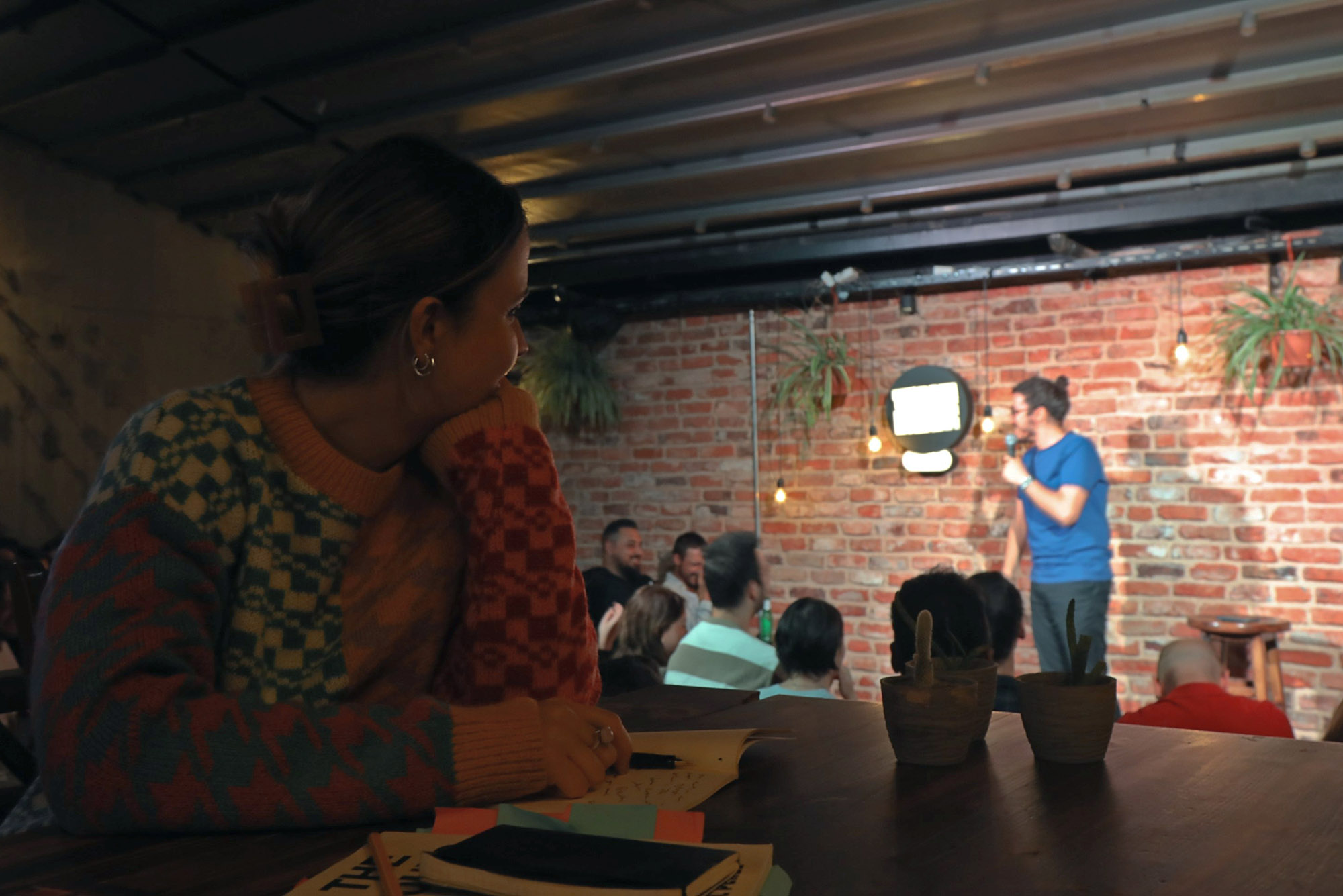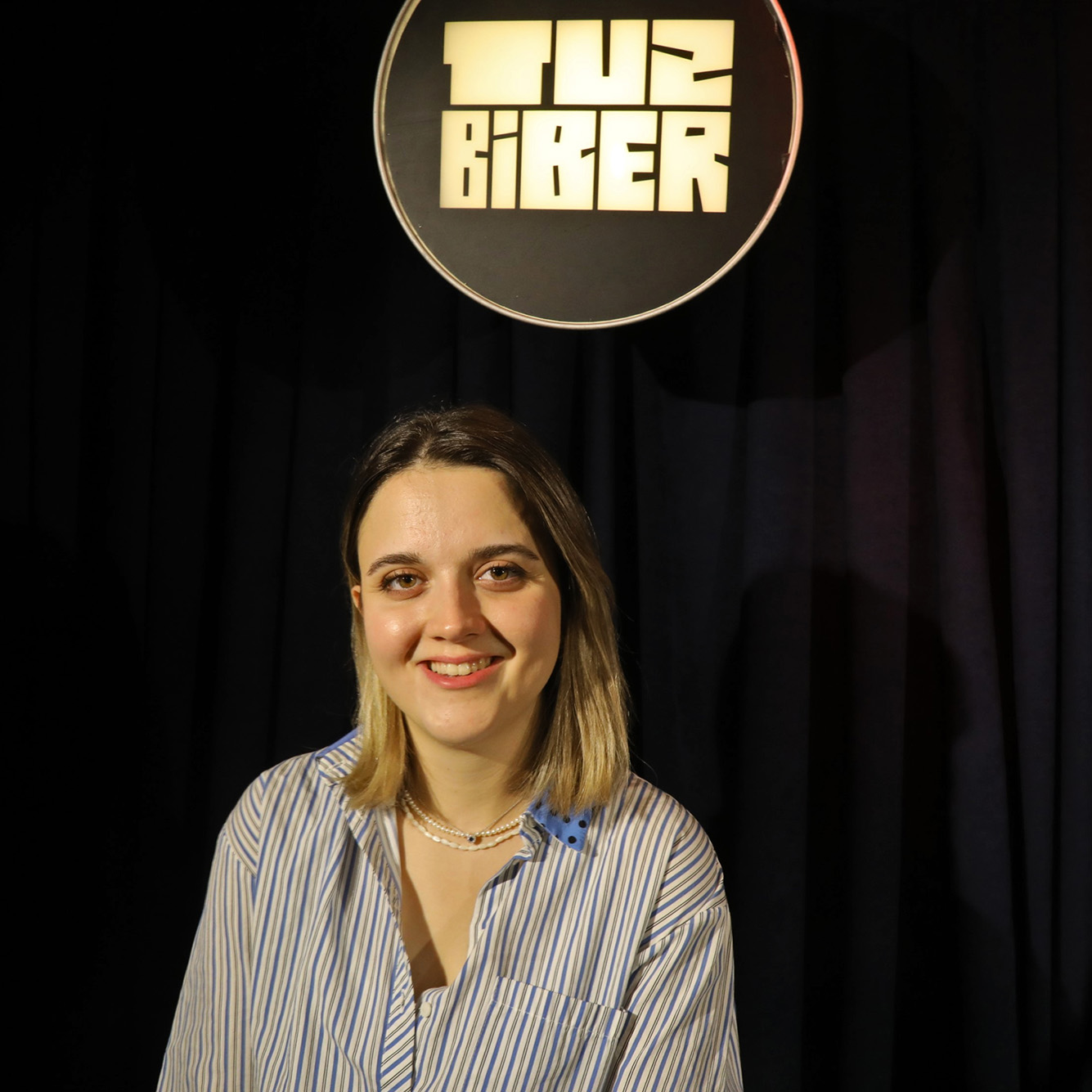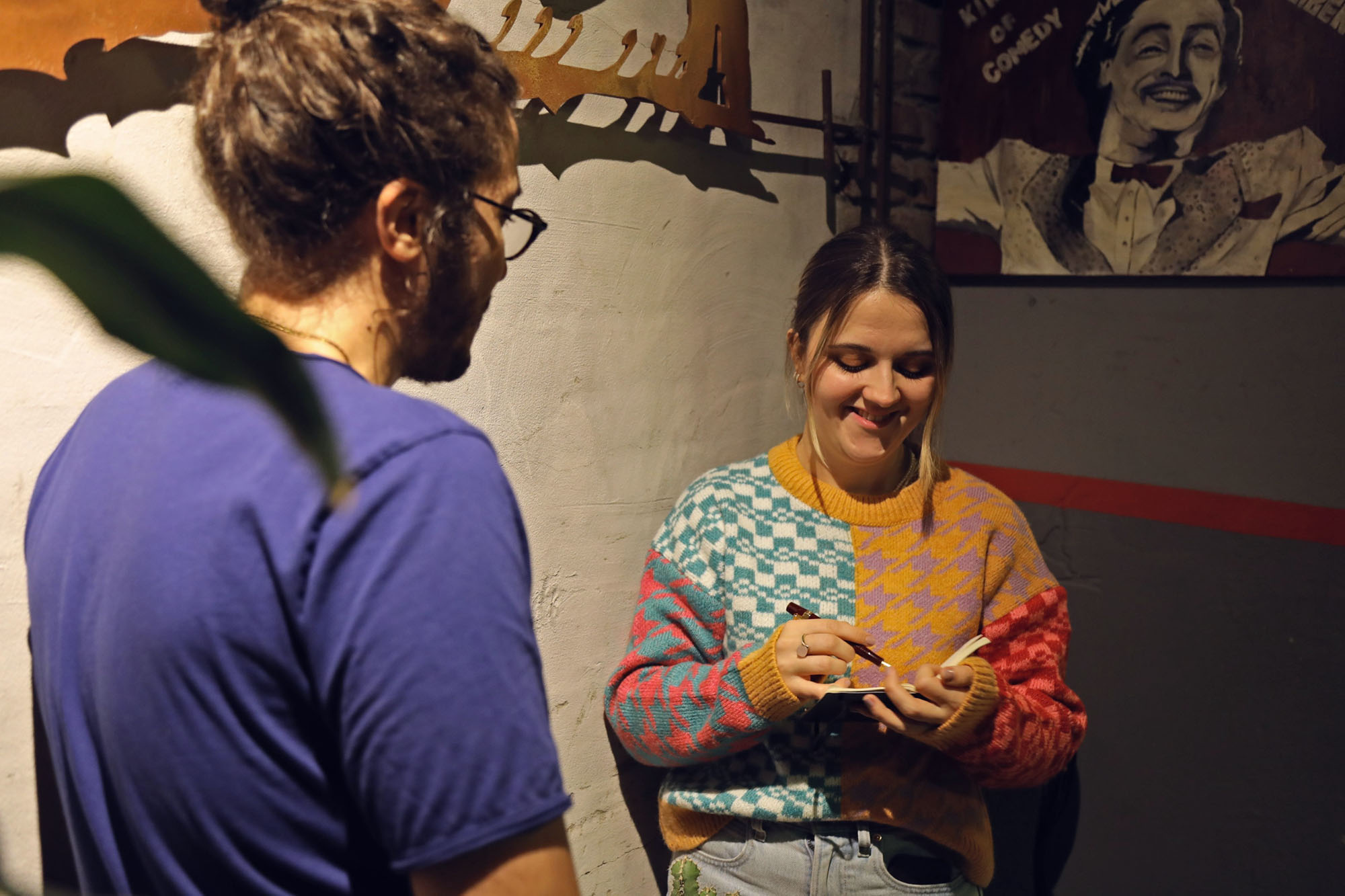How Comedians in Turkey Are Pushing Boundaries
BU anthropologist is studying a booming stand-up comedy scene in Istanbul to explore how humor makes marginalized communities visible

For Istanbul’s comedians, the ambiguity of Turkey’s laws makes it hard to know if a joke will land them laughs or jail time. BU PhD student Sümeyra Güneş (left) studies how they navigate the challenge.
How Comedians in Turkey Are Pushing Boundaries
BU anthropologist is studying a booming stand-up comedy scene in Istanbul to explore how humor makes marginalized communities visible
Many nights, anthropologist Sümeyra Güneş can be found backstage at a comedy club in Istanbul, Turkey, or watching from the crowd taking notes. She has become a regular at her local comedy clubs, mingling with the comedians and chatting up audience members. But she’s not there just for the jokes, although that’s a major perk. Güneş researches how stand-up comedians in Istanbul are making marginalized communities visible through humor, often toeing the line of what’s considered an “acceptable” joke to make in public.
“I look at how stand-up comedians claim visibility and carve themselves alternative spaces on the stage in a highly censored public space,” says Güneş, a Boston University College of Arts & Sciences PhD candidate in sociocultural anthropology. The possibility of being canceled or a joke not landing is always a fear for comedians. But under laws in Turkey, jokes that push certain social boundaries can have serious consequences, including jail time.

“A comedy show at one of the clubs begins with an announcement that says, ‘Please don’t record this show and send our friends to jail,’” says Güneş (GRS’26). The ambiguity of the law—specifically Article 216 of the Turkish Criminal Code, which, she says, is against “provoking the public to hatred, hostility, and degradation”—makes it hard to know what’s considered a criminal offense.
“They’re not sure what will make them end up in jail or what could get them canceled,” says Güneş, who grew up in Turkey. “But at the same time, they cannot resist the urge to try, because the boundaries are there to be pushed.”
Besides the legal consequences, there are social and professional ones, like people protesting outside of comedy clubs because of a joke they found offensive. Deciding what parts of a stand-up routine can get published on social media also presents another set of challenges for comedians to navigate.
“It’s a very tricky and interesting place and I’m trying to make sense of all of it,” she says.
Creating and Pushing Boundaries
Güneş has been researching comedy for the last three years of her PhD work, which began at Koç University in Istanbul, before she transferred to BU in 2020 with a Fulbright Scholarship. She compares her duties in comedy clubs to that of a human voice recorder: conversations, debate, arguments happen all around her, and her goal is to capture the moment and translate what she sees and hears into data that will inform her dissertation. On more than one occasion, she has followed people who run out of the club looking annoyed or crying (and not with laughter) to find out why a certain joke hit them so hard. It’s proven fruitful, though not everyone wants to open up to a stranger with a notepad.
One of her field sites is a club called TuzBiber Stand-Up, where performers put on shows almost every night of the week. The stand-up comedians that she’s specifically interested in hail predominantly from underrepresented communities, like LGBTQ+ people, as well as religious and ethnic minority groups. Through humor, “they’ve been trying to resist systemic silencing and assimilation by subverting the pejorative jokes that have been used for othering them,” Güneş says.
Many of the comedians she works with have accepted the fact that speaking up and pushing social boundaries comes with risks, and they joke about it with each other and on stage. A comedian who Güneş saw last month did a whole routine about how she was detained for questioning due to a joke that upset her religious minority community, and that people don’t understand her job. “It was really funny,” Güneş says. Another one of the comedians she watches has an entire set about going to jail for 10 days because of a stand-up routine.
“I’ve asked some of the comedians, ‘Aren’t you afraid of arrest?’ One of them said, ‘No, I’m not afraid of that. But I’m afraid of being stabbed,’” she says.
Despite the risks, comedy on the stages she studies is “a boundary-making practice,” she says. “They say, ‘Since I’m coming from this community, I can make this joke. But if you don’t come from this community, you can’t.’ So, it’s actually a way of claiming voice over your own identity.”

Even in her own family, Güneş recalls the humorous stories her grandmother shares about being an immigrant from North Macedonia living in Turkey. One well-worn tale relates a misunderstanding caused by her Macedonian Turkish dialect, which differs from the Turkish spoken in Turkey. Güneş’ grandmother once got into a fierce fight with a grocer’s wife, because she had accidentally called the grocer a “scoundrel,” by using a word that meant “short” in her native dialect.
“She likes to tell the story over and over again,” Güneş says. “I came to realize that by telling the story with humor she was reminding us of our immigrant identities in Turkey.”
Inspired by her grandmother, Güneş has tried her hand at stand-up a couple of times, but doesn’t want to mix her scholarly work with performing in the places she’s collecting data—she’s been accepted there as the anthropologist, and doesn’t want to complicate that. “I’m not funny in English anyway,” she says.
Watching a Comedy Boom in Turkey
Güneş has too many favorite comedians to name only one, but actor and comedian Cem Yılmaz—star of a number of English language movies—is one of the big names that comes to mind when somebody mentions stand-up comedy in Turkey. (And TuzBiber Stand-Up has an English Instagram account for those who are curious.)
Compared to when she started her research two years ago, Güneş says that the number of comedy stages and comedians in Istanbul has exploded. At first, she would meet 10 to 15 comedians a month, and now she can’t even count how many new faces come to the stage each month. It’s unclear why this comedy boom is happening all around her, but Güneş thinks it could be in response to a number of political issues happening in Turkey—with Recep Tayyip Erdoğan reelected as president in May, extending his two-decades-long leadership of the country—as well as a way for people to deal with recent trauma. For example, a pair of devastating earthquakes struck Turkey and Syria this year, killing over 50,000 people. Güneş overhears comedians discussing if and how they can tell jokes about that experience. There’s also an important municipal election at the end of March, so she’s expecting more political-flavored humor.
“It is a great time to be in the field and experience all of that,” she says. She’ll be continuing to collect data at the Istanbul clubs for at least another year, and hopefully longer.
Güneş believes that interrogating where lines are drawn between acceptable representation and offense has relevance beyond the stages in Istanbul. It also opens the door to having bigger conversations about how to regulate speech in spaces where rules are far more gray than black and white, like on social media platforms.
“Moderating content and regulating speech is an issue being discussed all the time. That’s why I feel like this research has broader theoretical relevance,” she says.
“When there’s a lot of repression that has been accumulated, people try to find alternative ways of resisting that silencing, like being vocal about their identities,” she says. “The comedy scene is an alternative space for identity representation. And people do value that space.”

Comments & Discussion
Boston University moderates comments to facilitate an informed, substantive, civil conversation. Abusive, profane, self-promotional, misleading, incoherent or off-topic comments will be rejected. Moderators are staffed during regular business hours (EST) and can only accept comments written in English. Statistics or facts must include a citation or a link to the citation.